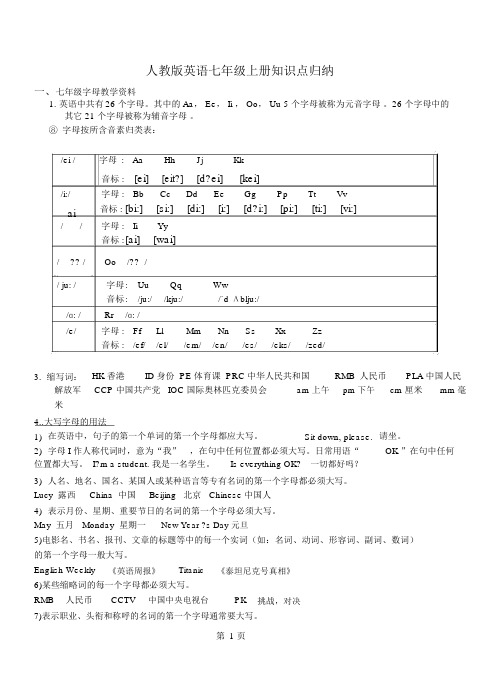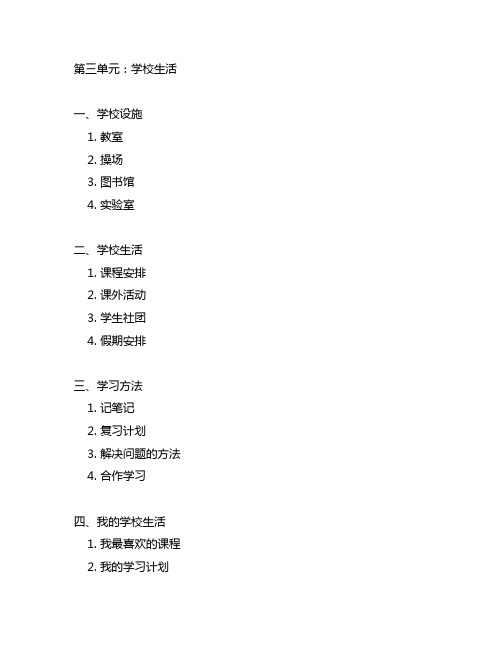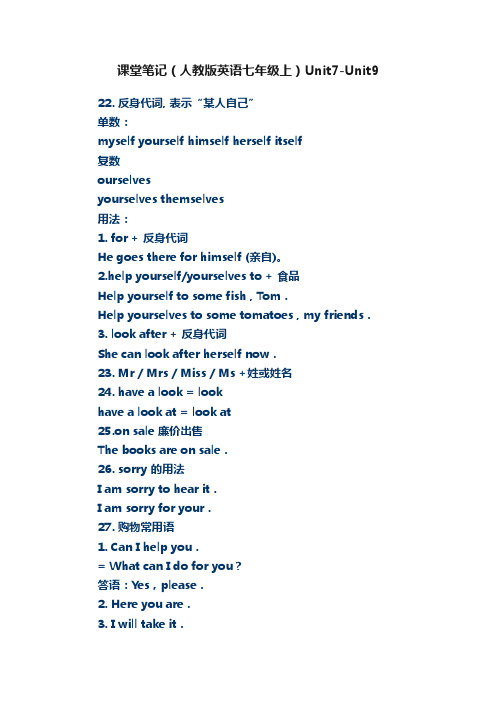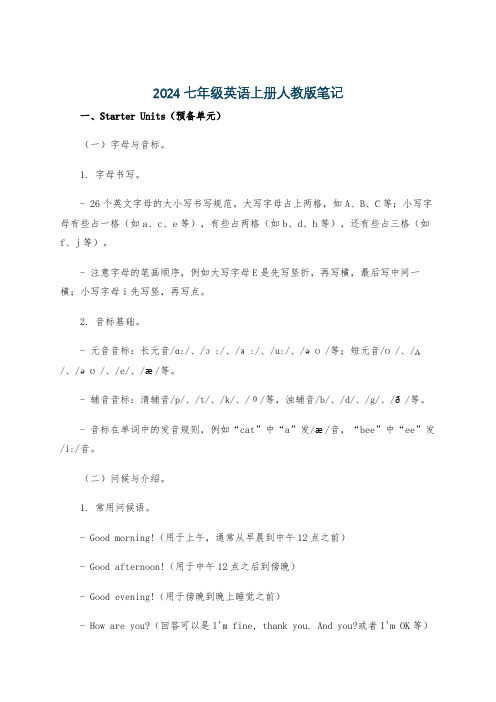人教版七年级上册英语笔记
人教版七年级英语上册-笔记归纳

人教版英语七年级上册知识点归纳一、七年级字母教学资料1. 英语中共有26 个字母。
其中的 Aa, Ee, Ii , Oo, Uu 5 个字母被称为元音字母。
26 个字母中的其它 21 个字母被称为辅音字母。
⑧ 字母按所含音素归类表:/ei /字母:Aa Hh Jj Kk音标 :[ei][eit?][d?ei][kei]/i:/字母 :Bb Cc Dd Ee Gg Pp Tt Vvai音标 : [bi:][si:][di:][i:][d?i:][pi:][ti:][vi:]/字母 :Ii Yy/音标 :[ai][wai]/?? /Oo/?? // ju: /字母:Uu Qq Ww音标:/ju://kju://`d Λblju://ɑ: /Rr/ɑ: //e/字母 :Ff Ll Mm Nn Ss Xx Zz音标 :/ef//el//em//en//es//eks//zed/3.缩写词:HK 香港ID 身份 PE 体育课 PRC 中华人民共和国RMB 人民币PLA 中国人民解放军CCP 中国共产党 IOC 国际奥林匹克委员会am 上午pm 下午cm 厘米mm 毫米4..大写字母的用法1)在英语中,句子的第一个单词的第一个字母都应大写。
Sit down, please.请坐。
2)字母 I 作人称代词时,意为“我” ,在句中任何位置都必须大写。
日常用语“OK ”在句中任何位置都大写。
I?m a student. 我是一名学生。
Is everything OK?一切都好吗?3)人名、地名、国名、某国人或某种语言等专有名词的第一个字母都必须大写。
Lucy 露西China 中国Beijing北京Chinese 中国人4)表示月份、星期、重要节日的名词的第一个字母必须大写。
May 五月Monday 星期一New Year ?s Day 元旦5)电影名、书名、报刊、文章的标题等中的每一个实词(如:名词、动词、形容词、副词、数词)的第一个字母一般大写。
人教版七年级英语上册-重要知识点笔记归纳

人教版英语七年级(上册)知识点归纳2016.95.大写字母的用法1) 在英语中,句子的第一个单词的第一个字母都应大写。
Sit down, please. 请坐。
2) 字母I作人称代词时,意为“我”,在句中任何位置都必须大写。
日常用语“OK”在句中任何位置都大写。
I’m a student. 我是一名学生。
Is everything OK? 一切都好吗?3) 人名、地名、国名、某国人或某种语言等专有名词的第一个字母都必须大写。
Lucy 露西China 中国Beijing 北京Chinese 中国人4) 表示月份、星期、重要节日的名词的第一个字母必须大写。
May 五月Monday 星期一New Year’s Day 元旦5)电影名、书名、报刊、文章的标题等中的每一个实词(如:名词、动词、形容词、副词、数词)的第一个字母一般大写。
English Weekly 《英语周报》6)某些缩略词的每一个字母都必须大写。
RMB 人民币CCTV 中国中央电视台PK 挑战,对决7)表示职业、头衔和称呼的名词的第一个字母通常要大写。
Uncle Lee 李叔叔Doctor Wang 王医生二、英语国际音标表(48个)音标分类[[][[[[]i][[u[[][三、区别元音字母Aa,Ee,Ii,Oo,Uu与元音二十个音素。
不定冠词a放在辅音开头的词前;an放在元音开头的词前。
大多数元音字母开头的词,一般发元音,但有些就不是,如字母Uu, 单词useful, university, European 等。
一般辅音字母开头的词发辅音,但有些就不是,如hour, honest这两个单词中h都不发音。
如:1) an Aa / Ee / Ii / Oo, an Ll / Ss / Xx / Rr an orange/apple/egg/ English teacher/ eraser / ID card/ 11-year-old boy;an hou r [′aʊə] 一小时,an honest man一个诚实的人(这儿的h不发音)an 8-year-old boy 一位八岁的男孩an egg an eraser2) a Uu/ Bb / Pp a useful [′jU:sful]book一本有用的书(这儿u第一个音发/ j/)a university[ju::nɪ′vɜ:sɪtɪ] 一座大学a European[′ju:rəpɪən] man 一位欧州人如:There is an “r” and a “u”in the word “ruler”.He is an English teacher. He’ll be back in half an hour.I eat an apple and a pear every day.五.英语句子成分:组成句子的各个部分即句子成分。
英语七年级上册人教版第三单元笔记

第三单元:学校生活一、学校设施1. 教室2. 操场3. 图书馆4. 实验室二、学校生活1. 课程安排2. 课外活动3. 学生社团4. 假期安排三、学习方法1. 记笔记2. 复习计划3. 解决问题的方法4. 合作学习四、我的学校生活1. 我最喜欢的课程2. 我的学习计划3. 我在学校参加的活动4. 我对学校生活的期待英语七年级上册人教版第三单元笔记作为学校里的一名学生,我们每天都要在校园里度过大部分时间。
在这个单元里,我们将学习有关学校生活的一些词汇和句子。
这些内容不仅帮助我们更好地描述和谈论学校生活,也能够让我们更加了解学校的相关设施和活动。
我们来看看学校的设施。
学校是我们学习和成长的地方,而学校的设施对我们的学习和生活有着重要的影响。
教室是我们上课学习的地方,而操场则是我们进行体育锻炼和休闲娱乐的场所。
图书馆和实验室也是我们学校里不可或缺的部分,它们为我们提供了更广阔的知识和学习领域。
我们需要了解学校生活的方方面面。
课程安排决定了我们的学习进度和学科分配,而课外活动和学生社团则丰富了我们的课余生活。
在学校生活中,我们还需要学会合理安排假期,既能够放松身心,又能够提高自己的能力和技能。
在学校学习的过程中,我们需要掌握一些有效的学习方法。
记笔记可以帮助我们更好地理解和记忆知识,而合理的复习计划可以提高我们的学习效率。
在解决问题和学习上,合作学习也是一个很重要的方式。
我要谈谈我的学校生活。
我最喜欢的课程是……,我制定了详细的学习计划……,我在学校参加了……活动,我期待……。
通过对自己学校生活的总结和回顾,我更加全面、深刻和灵活地理解了学校生活的相关内容。
学校生活是我们成长过程中不可或缺的一部分。
通过学习这个单元的知识,我对学校生活有了更深入的了解,并且也更加期待未来在学校里度过的美好时光。
希望未来的学校生活能让我更加充实和快乐。
作为学校生活的一部分,我们不仅要学习知识,还要学会如何与他人相处,如何解决问题,如何充实自己的课余生活。
课堂笔记(人教版英语七年级上)Unit7-Unit9

课堂笔记(人教版英语七年级上)Unit7-Unit922. 反身代词, 表示“某人自己”单数:myself yourself himself herself itself复数ourselvesyourselves themselves用法:1. for + 反身代词He goes there for himself (亲自)。
2.help yourself/yourselves to + 食品Help yourself to some fish , Tom .Help yourselves to some tomatoes , my friends .3. look after + 反身代词She can look after herself now .23. Mr / Mrs / Miss / Ms +姓或姓名24. have a look = lookhave a look at = look at25.on sale 廉价出售The books are on sale .26. sorry 的用法I am sorry to hear it .I am sorry for your .27. 购物常用语1. Can I help you .= What can I do for you ?答语:Yes,please .2. Here you are .3. I will take it .= I will have it .= I will buy it .28 . 一般将来时态:表示将来的动作或状态。
构成:助动词will+动词原形。
时间状语:将来时间next week / month / year , tomorrow 等。
句型变化:将来型He will study English .否定He won’t study English .一般疑问句 Will he study English ?回答: Yes,he will ;No, he won’t .特殊疑问句What will he study ?29. 几个重要介词1. atHe buys a T-shirt at Huaxing’s great sale. They have pants at a very good price .2. forA . 表示“交换的价格”He has pants for only ¥50 .B. 表示“对某人来讲”For me , I will study hard .C . for + 反身代词We will go there for ourselves next week .3. inA.在---内部My pen is in the desk .B . in +颜色I have bags in red .= I have red bags . She is in red .=She wears red clothes . Unit8单词1. 一年12月份JanuaryFebruaryMarchAprilMayJuneJulyAugustSeptemberOctoberNovember December2. 一周的七天SundayMondayTuesdayWednesday ThursdayFridaySaturday3. 一年四季springsummerautumn / fallwinter语法A.数词的分类基数词:表示数量序数词:表示顺序A . 1 one first2 two second3 three third4 four fourth5 five fifth6 six sixth7 seven seventh8 eight eighth9 nine ninth10 ten tenthB . 11 eleven eleventh12 twelve twelfth13 thirteen thirteenth14 fourteen fourteenth15 fifteen fifteenth16 sixteen sixteenth17 seventeen seventeenth18 eighteen eighteenth19 nineteen nineteenthC. 20 twenty twentieth30 thirty thirtieth40 forty fortieth50 fifty fiftieth60 sixty sixtieth70 seventy seventieth80 eighty eightieth90 ninety ninetieth100 hundred hundredthD . 几十几23 twenty-threetwenty-thirdB.when 引起的特殊疑问句1. His birthday is on Jan.2nd .When is his birthday ?2.Their parties is on Sunday .When are their parties ?3.The students go to school on Monday . When do the students go to school ?4.She can go home in the afternoon.When can she go home ?5.Mary does her homework in the evening . When does Mary do her homework ?6.They will have a parents’ meeting this Friday. When will they have a parents’ meeting ?when 与 what time 的区别:when 笼统时间what time 具体时刻1.He watches TV in the evening .When does he watch TV ?2. They watch the game at 8 o’clock .What time do they watch the game ?C. 提问“星期”和“日期”1. It’s Monday today .What day is it today ?2. It’s Feb.3rd today . What’s the date today ?词汇知识1.birthday(复) birthdays2. monthmouthmouse3.happy (同义) glad , pleased (反义) unhappy sad4.Happy birthday to you ! (答语) Thanks 或 Thank you .5.old (反义) new , young6.speech (复数) speeches7.party (复数) parties8.演讲比赛speech contest9.一件艺术品an art10.一堂美术课an art lesson / class11.Chinese:汉语;中国人用汉语 in Chinese中国 China三个中国人three Chinese一位汉语老师/课a Chinese teacher/ lesson / class Chinese(复数) Chinese Japanese(复数) Japanese12.听音乐listen to music13.她13岁了。
2024七年级英语上册人教版笔记

2024七年级英语上册人教版笔记一、Starter Units(预备单元)(一)字母与音标。
1. 字母书写。
- 26个英文字母的大小写书写规范。
大写字母占上两格,如A、B、C等;小写字母有些占一格(如a、c、e等),有些占两格(如b、d、h等),还有些占三格(如f、j等)。
- 注意字母的笔画顺序,例如大写字母E是先写竖折,再写横,最后写中间一横;小写字母i先写竖,再写点。
2. 音标基础。
- 元音音标:长元音/ɑ:/、/ɔ:/、/ɜ:/、/u:/、/əʊ/等;短元音/ʊ/、/ʌ/、/əʊ/、/e/、/æ/等。
- 辅音音标:清辅音/p/、/t/、/k/、/θ/等,浊辅音/b/、/d/、/g/、/ð/等。
- 音标在单词中的发音规则,例如“cat”中“a”发/æ/音,“bee”中“ee”发/i:/音。
(二)问候与介绍。
1. 常用问候语。
- Good morning!(用于上午,通常从早晨到中午12点之前)- Good afternoon!(用于中午12点之后到傍晚)- Good evening!(用于傍晚到晚上睡觉之前)- How are you?(回答可以是I'm fine, thank you. And you?或者I'm OK等)2. 自我介绍。
- My name's...(例如My name's Tom.)- I'm...(I'm a student.)二、Unit 1 My name's Gina.(一)重点单词。
1. name.- 名词,名字。
例如:What's your name?2. nice.3. to.- 在这里是不定式符号,如Nice to meet you中的to;也可作介词,表示“到……”,例如go to school。
4. meet.- 动词,遇见;会面。
例如:Nice to meet you.5. too.- 副词,也;太。
七年级英语人教版上册课堂笔记

七年级英语⼈教版上册课堂笔记⼈教版英语七年级上册课堂笔记Unit 1~81. on、above都表⽰在某物体的位置上,但是,on是在物体的接触⾯上,⽽above则是与物体有⼀段距离。
2. Please take things to your sister.(祈使句:动词⽤原形)3. football: ①soccer ball 英式⾜球②rugby ball 美式⾜球(橄榄球)4. let’s = let us dislike = don’t like5. It is some salad. ( salad是不可数名词,因此谓语动词⽤it。
)6.可数名词与不可数名词:⑴可数名词的定义:普通名词所表⽰的⼈或事物,是可以按单个来计算的。
⑵不可数名词的定义:如果普通名词所表⽰的事物,⼀般来说,是不能按单个来计算的。
7.省略主语的祈使句:⑴Close your book, please!(肯定句)⑵Don’t open your book. (否定句)8. I like apples, she likes apples, too.= I like apples, she also likes apples.9. dinner和supper都有晚饭的意思,但两者还是存在区别的,dinner 是指⼤型饭局,⽽supper是指家常便饭。
10. some+可数名词复数形式/ 不可数名词11. there be:某处存在某物have:某⼈拥有某物12. sounds interesting: 系动词+形容词=表系表结构13. lots of = a lot of :⽤在肯定句,修饰可数名词复数形式或不可数名词many、much :⽤在疑问句,many修饰可数名词复数形式,much 修饰不可数名词。
14.反义词:like→dislike fair→unfair15. at all :根本for :对于,就……⽽⾔be on sale :特价in white T-shirt :in,穿clothes :⾐服(复数)sell :⾏为动词16. Let sb. do sth.17.⑴like to do :⼀次性动作⑵like doing :经常性动作18. How much is this bag ?=What’s the price of this bag ?19.多个形容词在名词前时,先说⼤⼩形状再说颜⾊,描述性的形容词放在最前。
【人教版七年级上】新目标七年级全册英语复习笔记

七年级上册英语复习笔记Unit 1 My name's Gina一、重点词汇:answer my question 回答我的问题ID card身份证first name=given name名字last name=family name 姓氏telephone number=phone number电话号码Let's=Let us 让我们.glad/Nice to meet/ see you. 见到你很高兴.how many + n(pl) 多少how much + n.(u) 多少That's all right. 好;行;不用谢;没关系All right .好的,行,好吧Not at all.=It's a/my pleasure =That's OK. =You're welcome. =That's all right. 不用谢语法:1,形容词性物主代词:my(我的) your(你的) his/her/its(他/她/它的) our(我们的) your(你们的)their(他们的)后面需要接名词,修饰名词,做前置定语。
在句中可作主语,宾语等成分。
二、常用缩写词:HB (硬黑)CD(光盘) BBC(英国广播公司) NBA(美国篮球协会) kg(千克) UFO(不明飞行物) CCTV(中央电视台) UN(联合国) P (停车区) S\M\L(小\中\大)号WTO(世界贸易组织)Unit 2 Is this your pencil ?一、重点词汇:eraser橡皮擦pencilcase文具盒backpack双肩背包dictionary字典、词典pencil sharpener铅笔刀Excuse me打扰了(客套语)in English用英语baseball棒球watch手表play computer game电脑游戏notebook笔记本ring戒指call at打电话lost and found失物招领book书school ID card学生证a set of keys一串钥匙7. look at 朝 (8)See you later.=See you soon再见句型:1. Excuse me. 打扰了。
七年级上册英语人教版课堂笔记

七年级上册英语人教版课堂笔记Unit 1 My name's Gina.一、重点单词。
1. name.- 名词,意为“名字;名称”。
例如:My name is Tom.(我的名字是汤姆。
)- 常用短语:first name(名字),last name/family name(姓氏)。
2. nice.- 形容词,意为“令人愉快的;宜人的”。
例如:Nice to meet you.(很高兴见到你。
)3. to.- 在这里是不定式符号,无实际意义,用于某些固定搭配,如Nice to meet you.- 也可作介词,意为“到;向;朝着”等,例如:go to school(去上学)。
4. meet.- 动词,意为“遇见;相逢”。
例如:I meet my friend at the park.(我在公园遇见我的朋友。
)5. too.- 副词,意为“也;又;太”。
例如:I'm fine, too.(我也很好。
);The box is too heavy.(这个盒子太重了。
)6. your.- 形容词性物主代词,意为“你的;你们的”。
例如:What's your name?(你的名字是什么?)二、重点句型。
1. —What's your name? —My name's Gina.- 这是询问和回答名字的常用句型。
“What's...”是用来询问某人或某物是什么的句型,回答时用“My name's...”或者“I'm...”。
2. Nice to meet you. Nice to meet you, too.- 初次见面时的礼貌用语,表示“很高兴见到你”及其回应。
3. —Are you Helen? —Yes, I am. / No, I'm not.- 这是一般疑问句及其回答。
一般疑问句以be动词(am/is/are)开头,回答时用yes或no,然后根据实际情况使用相应的be动词形式。
- 1、下载文档前请自行甄别文档内容的完整性,平台不提供额外的编辑、内容补充、找答案等附加服务。
- 2、"仅部分预览"的文档,不可在线预览部分如存在完整性等问题,可反馈申请退款(可完整预览的文档不适用该条件!)。
- 3、如文档侵犯您的权益,请联系客服反馈,我们会尽快为您处理(人工客服工作时间:9:00-18:30)。
七年级上册笔记1.Good morning!早上好,上午好Good afternoon!下午好Good evening!晚上好Good night!(不是问候语,而是晚上分别时或就寝前的道别用语,它的含义是“晚安”,“再见”)2.A: How are you? 你好吗?B: I’m OK/ fine / well, thanks.我很好。
谢谢。
How is your mother? She is fine. 你妈妈好吗?她很好。
3.A: What’s thi s in English? B: It’s an orange. A: What’s that in English? B: It’s a jacket. (回答What’s this和What’s that时,用人称代词it,不用this和that)4.What’s the English for 枕头?“枕头”用英语怎么说?It’s a pillow.5.Spell it, please.请把它拼写出来。
/Can you spell it, please?/ How do you spell it? / Do you know how to spell it?6. What color is it? It’s purple.7. 特殊疑问句= 疑问词+一般疑问句8.冠词:冠词有三个:a, an和the。
a和an是不定冠词。
The是定冠词。
冠词一定置于名词之前。
/ 定冠词the通常有明确的所指,即说话人和听话人已知的人或事。
通常翻译成“这”“那”。
The white model plane is hers. The milk is on the table./ 不定冠词a, an放在单数名词前,通常翻译成“一个”或表示分类。
Do you have a volleyball? A rose is a flower.1.What’s your name? My name is Gina. / I’m Gina.2. What’s his name? His name is Eric. / He’s Eric.3. What’s her name? Her name is Mary. / She’s Mary.4. A: Nice to meet you. B: Nice to meet you, too.6. I’m Helen.→Are you Helen? He’s Jack. →Is he Jack?7. What’s your telephone number? It’s 281-9176.8. My telephone number is 358-6344.→Is your telephone number 358-6344? 9. first name=given name名last name=family name 姓10. Mr. 先生Ms. 女士Mrs 夫人太太(加在姓氏之前,如Mr. Black, Ms. Green)11. ID card 身份证,信息卡school ID card 学生证12. 5.family的用法(1)family:家庭(当指家庭时常看作单数,根据句子意思来判断)例:My family is a big[big](大的) family. 我的家庭是一个大家庭。
(2)family:家人(当指家人时常看作复数,根据句子意思来判断)例:My family are friendly[`frendli](友好的). 我的家人很友好。
1. This is my friend Jane. That’s my sister Sally.2. These are my brothers. Those are my parents.(this这,that 那,these这些,those那些。
这四个单词叫指示代词。
)3. Who’s she? She’s my cousin. Who’re they? They’re my grandparents.4. Oh, I see. 我知道了。
(我明白了)5. A: Have a good day! 愿你们(一天)玩得高兴!B: Thanks! You, too. 多谢,你也是。
6. take turn to do 轮流做某事。
7. male男人,男性的female 女人,女性的9.Here is a photo of my family. Here are some of my friends. Here be…. 这是…这儿有… 10.photo = picture 照片11. the name of my dog 我的狗的名字(of表所属关系,of之前的名词归属于of之后的食物如,a photo of my family我的一张全家福)1. Is this your pencil? Yes, it is. It’s mine. / No, it isn’t. It’s hers.2. Is that your schoolbag? Yes, it is. / No, it isn’t.3. Are these your books? Yes, they are. / No, they aren’t. They’re Bob’s.(用yes或no回答的问句叫一般疑问句。
答语中的主语用人称代词)4. A:Thank you for your help.= Thanks for your help.(名词)B: You’re welcome. 不用谢(不客气)5. ask sth for sb 向某人要某物Ask the teacher for it. Don’t ask money for your parents.不要向你的父母要钱。
6. call sb 给某人打电话Call me at 685-6034.拨打电话685-6034找我。
Call Jane at 284-5486. E-mail me at mary g2@ 7. I lost my school ID card. 我丢了我的学生证。
(lose-lost-lost)8. a set of keys 一串钥匙,一套钥匙。
a set of…一套…一副… a set of books /a set of music CDs9. Excuse me. 打扰了10人称代词和物主代词● 形物后必须加名词。
名物后不加名词。
例如:This is my book. /This book is mine.11. 名词和名词所有格 名词所有格表示所属关系。
名词和名词所有格的关系相当于人称代词和无主代词的关系。
如:Tom-- Tom ’s (Tom 的) my sister--my sister ’s(我妹妹的) / 名词所有格的构成:单数名词,加’s 。
如: Mike ’s 。
复数名词不以s 结尾的,加’s 。
如: children ’s 复数名词以s 结尾的,加’。
如:your parents ’ 1. Where ’s the map? It ’s in your parents ’ room. 2. Where ’re my books? They ’re under the chair. 3. Come on.表示催促,鼓励。
含义是“加油”“赶快”“快点儿”4. tape player 录音机5.model plane 飞机模型 6. Gina ’s books are everywhere.吉娜的书到处都是。
1. Do you have a ping-pong bat? Yes, I do. / No, I don ’t.2. Does she have a tennis ball? Yes, she does./ No, she doesn ’t.3. Let ’s go! /Let me get it. /Let ’s play. /Let ’s ask. /Let ’s play basketball. (let sb do 让某人做某事)4. That sounds good.(sound 是系动词后加形容词)5. We go to the same school. My brother and I are in the same school. (same 前要加the )6. We play soccer at school with our friends. After school, I play ping-pong with my classmates. (with sb 和某人一起)7. play sports 做运动8. I only watch them on TV . 我只在电视上看他们。
1. I like oranges. I don ’t like oranges. Do you like Bananas? No, I don ’t.2. He likes salad. He doesn ’t like ice-cream. Does he like vegetables? Yes, he does.(like 后加可数名词时,一定加复数表示一类)3. Let ’s think about the food.(think about 思考,考虑)4. How about burgers, vegetables and some fruit? What about lunch?(How about sth =What about sth?)5. Sports star eats well. (副词well 修饰实意动词eat )6. David ask s the volleyball star, Cindy Smith, about her eating habits. (ask sb about sth 问某人有关某事)7. What do you like for breakfast?(for 与一日三餐搭配使用时,表示各餐所吃的食物。
For breakfast, I often eat eggs.)8. What fruit do you like? 9. Do you like hamburgers for dinner? 10. one last question 最后一个问题11. I don ’t want to be late.(want to do 想要做某事) 12. 一般疑问句,否定句和特殊疑问句14.名词:名词表示人或事物的名称。
